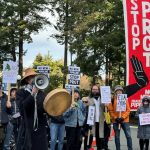The Province has declared that the controversial Prince Rupert Gas Transmission pipeline (PRGT) is “substantially started” and may proceed under its decade-old environmental assessment certificate.
The pipeline project is sparking legal pushback from Indigenous communities, local communities, scientists, and conservation advocates. The groups are raising red flags over what they call a failure on the part of the BC Energy Regulator to follow its own rules.
Pro-democracy and climate organizers launched sit-ins at the Ministry of Energy and Climate Solutions in Victoria and BC Premier David Eby’s office in mid-May, demanding the BC government reject the US-backed PRGT pipeline.
The BCER is greenlighting the 900-km pipeline without completing a mandatory assessment of the pipeline’s cumulative environmental impacts.
The BCER’s regulatory obligations were thrown into question on May 28, when the Legislature passed Bill 15, The Infrastructure Project Act. The Act gives the Lieutenant Governor and Infrastructure Minister sweeping powers to expedite approvals by removing assessment requirements for public projects it deems “provincially significant.” Those projects include housing, schools, critical mineral mines, and pipelines.
“We are risking the prosperity and health of future generations for profits in the hands of American investors”
Eby is using Trump’s tariffs and politial threats as reasons to expand the LNG industry. However, approving the PRGT pipeline puts more control of Canada’s energy infrastructure into the hands of American billionaires, including Blackstone CEO David Schwarzman and President Johnathan Gray. Both are Republican megadonors and the biggest landlords on the planet, with more than $400 billion in real estate assets worldwide. Blackstone’s affiliate, Blackstone Energy Transition Partners, plans to invest $150 million in equity securities with Western LNG, PRGT Ltd’s co-owner with the Nisga’a Lisims (elected government).
Grand Chief Stewart Phillip of the Union of BC Indian Chiefs said, “We are risking the prosperity and health of future generations for profits in the hands of American investors. I am proud to stand in solidarity with the Nisga’a, Ts’msyen, Gitanyow, Gitxsan, and Wet’suwet’en people who will continue to fight against this project.”
Last January, PRGT Ltd. declared, “Ksi Lisims LNG’s Application for an Environmental Certificate has undergone a comprehensive technical review, including engagement with participating Indigenous nations, regulators, stakeholders, and the public, and is now complete.”
A permit condition explicitly requires a full evaluation of the project’s cumulative effects
This precipitous declaration was false. Representatives from the Skeena Watershed Conservation Coalition, the Kispiox Valley Community Centre Association, and the Kispiox Band Council travelled to BC Supreme Court in April 2025 to testify that the BCER had amended permit conditions to allow preliminary construction on the pipeline, even though a cumulative effects assessment on the project has not been conducted.
The representatives called out the BCER’s ongoing lack of transparency they feel undermines environmental and processual accountability which threatens vital ecosystems, salmon populations, and the rights of Indigenous communities whose territories lie in the pipeline’s path.
Cumulative impacts
BCER is now allowing PRGT Ltd. to move forward on what the company calls “Section 5B” of the pipeline, located on Nisga’a Nation territory. The regulator is relying on a decade-old environmental assessment. The move sidesteps a permit condition that was added in 2022 that explicitly requires a full evaluation of the project’s cumulative effects before construction proceeds.
Shannon McPhail, executive director of SWCC, says, “The regulator seems to be breaking their own permit conditions to try to push the project through in order to avoid the expiry of their environmental assessment certificate.”
The project is sowing bitter seeds of conflict between the Gitanyow and the Nisga’a nations
The permit condition created by the BCER was clear that a cumulative effects assessment of the project must be completed prior to construction start. But PRGT Ltd. and Nisga’a Lisims, the pipeline’s owners, now argue that the definition of “project” only meant Section 5B and not the pipeline itself.
Nisga’a Lisims’ lawyers made it clear their Nation’s government did not want to update the old cumulative effects assessment. The BCER abdicated the defense of its actions to PRGT Ltd., which, in turn, defended the regulator’s decision in deference to its American shareholders.
Indigenous rights denied
Despite the PRGT pipeline crossing 50 km of Gitanyow Nation territory, the Environmental Assessment Office excluded Gitanyow from “participating Indigenous nation” status under BC’s Environmental Assessment Act. The Environmental Assessment Office concluded there was “no reasonable possibility” that the project would adversely affect Gitanyow’s land rights, offering its members only the chance to submit comments during a public review period.
The project is sowing bitter seeds of conflict between the Gitanyow and the Nisga’a nations, dividing family and friends who have members in both communities. “Perhaps the Province’s approach to their own DRIPA legislation only applies to those Nations who say yes to massive LNG projects while insulting those Nations and communities who raise reasonable concerns.” said McPhail.
Janelle Lapointe of Stella’ten Nation said, “There is an overwhelming sense of disempowerment. I have heard, over and over, we might as well benefit from projects, since they will happen with or without us. This is why I am outspoken about the false choice of economic reconciliation and the weaponization of systemic poverty.”
“It is particularly alarming that the government is willing to bring more violence and surveillance to opposing Nations just to increase profits of wealthy American investors. If the project really is in the best interest of British Columbians and First Nations along the pipeline route, it should have no problem withstanding an environmental assessment and going through the due process of getting free, prior, and informed consent,” Lapointe told the Watershed Sentinel.
Sidney Coles holds two PhDs. She is a journalist and writer and lives in Victoria on the traditional territory of the lək̓ʷəŋən people.




